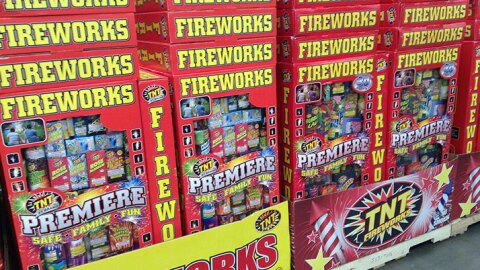Historically, Ohioans could buy fireworks in the state, but they had to sign a form—often with a wink and a nod—promising to set them off out of state. But that changes Friday.
A new law lets people set off backyard fireworks during certain times of the year, but it also lets cities ban certain types of fireworks like roman candles and bottle rockets.
Days before Independence Day, fireworks are flying off the shelves at Phantom Fireworks in Millersport, just east of Columbus.
Store manager Travis Snavely said they've hired over 80 employees to get them through the 4th of July rush.
He wouldn't go into specifics on sales figures, but he said they're anticipating the biggest year they've ever had.
“It'll be interesting. We've never had legalized fireworks in Ohio, so we're kind of dabbling into some uncharted territories," Snavely said.
The new state law Gov. DeWine signed last November allows most Ohioans to purchase and discharge consumer-grade fireworks over the Fourth of July weekend and other specified times of the year.
Those days include New Year's Eve, New Year's Day, Cinco de Mayo, Chinese New Year, Diwali, Juneteenth, Memorial Day and Labor Day weekends and July 3rd, 4th, and 5th, as well as the three-day weekends on either side of July 4th.
Local municipalities are still allowed to set their own rules governing where and when fireworks can be set off. They can also ban them altogether.
The City of Columbus did just that earlier this month, outlawing the use, possession and sale of most types of fireworks within city limits.
“Things like M80s, black cats, bottle rockets, anything that goes boom or flies up in the air," are all banned in Columbus, said Assistant Chief of Fire Prevention David Baugh.
Baugh said things such as sparklers, snakes, smoke bombs and fountain devices are still OK.
Just be sure to check local laws before setting off your own backyard blast.
Other Columbus suburbs that are banning home fireworks displays this year include Bexley, Dublin, Gahanna, Hilliard, Powell, Westerville and Worthington.
Upper Arlington residents can apply for a written fireworks permit. The cost is $3,500. Otherwise, fireworks are banned in the community.
In the last two months alone, Baugh said, Columbus has seen two fires and one fireworks-related injury.
He said extra fire investigators will be out this weekend making sure Columbus residents comply with the rules. Violations could result in up to 30 days in jail and up to a $1,000 fine.
“Not to be a party pooper for your backyard barbecue, but take the time to go to one of the sanctioned events that are happening all across central Ohio," he said.
Several neighboring cities have followed suit with their own restrictions on fireworks, including Dublin and surrounding Washington Township.
Washington Township Fire Marshall Sam Parsons said fireworks can rain down hot ash and debris on homes, potentially causing a fire.
"The weather we've had recently in the last seven to ten days, little to no rain, has caused for some dry environmental conditions," Parsons said.
Of course, like every year, there will be some that shirk the rules. Dublin Police Chief Justin Páez expects a busy night on July 4th responding to fireworks-related calls.
"It's more trouble than they want. It's more trouble than they need. There are other places in the state of Ohio you can go to discharge fireworks, but in the community, we want to make sure that it's clear that's not something that we're going to permit," Páez said.
Phantom Fireworks store manager Travis Snavely encourages people that do buy fireworks to get them only from licensed retailers.
“Safety is the name of the game. We don't want anyone to get hurt. We want people to enjoy their launch and celebrate Independence Day," he said.
Snavely doesn't expect local bans will cut too deeply into their sales. As he puts it, they like to believe they sell memories.
"You could go spend $300 on groceries and be upset when you walk out that you spent that much money, but almost every customer that leaves these doors is ecstatic and excited," said Snavely.



